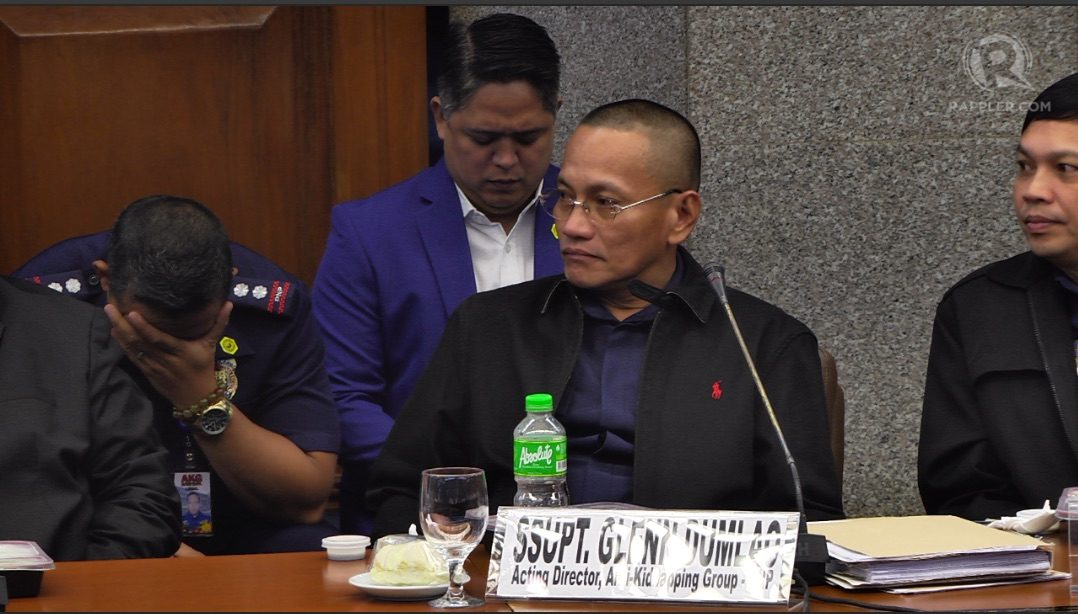SUMMARY
This is AI generated summarization, which may have errors. For context, always refer to the full article.

MANILA, Philippines (UPDATED) – South Korean businessman Jee Ick Joo was killed to “silence” him on the police extortion of Korean nationals in Angeles City, Pampanga, the chief of the Philippine National Police Anti-Kidnapping Group (PNP-AKG) told a Senate panel on Thursday, February 23.
Senior Superintendent Glenn Dumlao made the statement at the second Senate hearing on Jee’s case on Thursday, when Senator Leila de Lima asked if he was convinced that it was a kidnap-for-ransom case. (WATCH: LIVE: Senate hearing on ‘TokHang for ransom’)
Dumlao, citing his investigation, said the intention was to “assassinate” Jee, and not just to get ransom payment from his family.
Jee was killed the same day he was abucted from his home on October 18, 2016. Kidnappers only asked for ransom from Jee’s wife, Choi Kyung Jin, on October 30.
“Nag-conduct kami ng intelligence. Nakikita namin na ‘yung pag-abduct, he’s already a target – papatayin na talaga ‘yun,” Dumlao said.
(We conducted intelligence. We are seeing that when he was abducted, he was already a target – he was really going to be killed.)
“Nakita ko, pag-assume ko [ng kaso], talagang i-a-assassinate siya (I saw, when I assumed [the case], that he was really going to be assassinated), Ma’am. The motive is really to silence him. Kasi (Because) Ma’am, this is through an intelligence report, because of the extortion na nangyayari sa (that is happening in) Korean communities especially in Angeles City, where bulk of Koreans are there, specifically in online gaming,” he added.
De Lima said the ransom demand seemed to be just “an afterthought,” an observation that Dumlao shared. When asked who got the ransom, Dumlao had no definitive answer yet.
“Yes, Ma’am, naging afterthought na lang nila ‘yun. Pinu-push talaga namin sino kumuha ng ransom, ‘yung nag-facilitate ng ransom release (Yes, Ma’am, that was just an afterthought. We are really pushing to find out who received the ransom, who facilitated the ransom release),” he said.
‘No Korean mafia involved’
Both the PNP-AKG and the National Bureau of Investigation said the “Korean mafia” is not involved in Jee’s slay.
“There is no involvement of Korean mafia,” Dumlao said.
They explained that while there are organized Korean crime groups in the country, they have no information that a “mafia” exists in the Philippines.
“Initial report we gathered from the deputy director is that as of the moment, we cannot say with certainty that there is a Korean mafia in the Philippines. The report only states there are some organized criminal Korean groups in the country. As to mafia, at the moment, we cannot state a positive or negative [answer],” NBI Assistant Director Medardo de Lemos said at the hearing.
The PNP-AKG chief said they are looking into the alleged involvement of a South Korean named Edward Yu-on, who supposedly asked for a total of P800,000 from Jee’s wife.
“After the abduction, Sir…he approached the victim’s wife, Mrs Choi, and asked P500,000 to fast-track the resolution of the case, according to him, at paghahatian daw ng AKG at saka NBI (and the AKG and the NBI would share it) and then another P100,000 after a few days, para ibigay daw sa (to be given to the) AKG director,” Dumlao said.
“And then after a few days, again bumalik na naman ito at humingi na naman ng P200,000 para daw sa (he returned and asked for another P200,000 for the) LTO (Land Transportation Office),” he added.
The cops who kidnapped Jee in October 2016 apparently used the administration’s war on drugs as a cover.
The case had prompted a halt in the government’s Oplan TokHang anti-drug strategy, which involved cops knocking on the doors of alleged drug suspects to persuade them to mend their ways. The drug war has claimed more than 7,000 lives since the Duterte administration took over on July 1. – Rappler.com
Add a comment
How does this make you feel?
There are no comments yet. Add your comment to start the conversation.